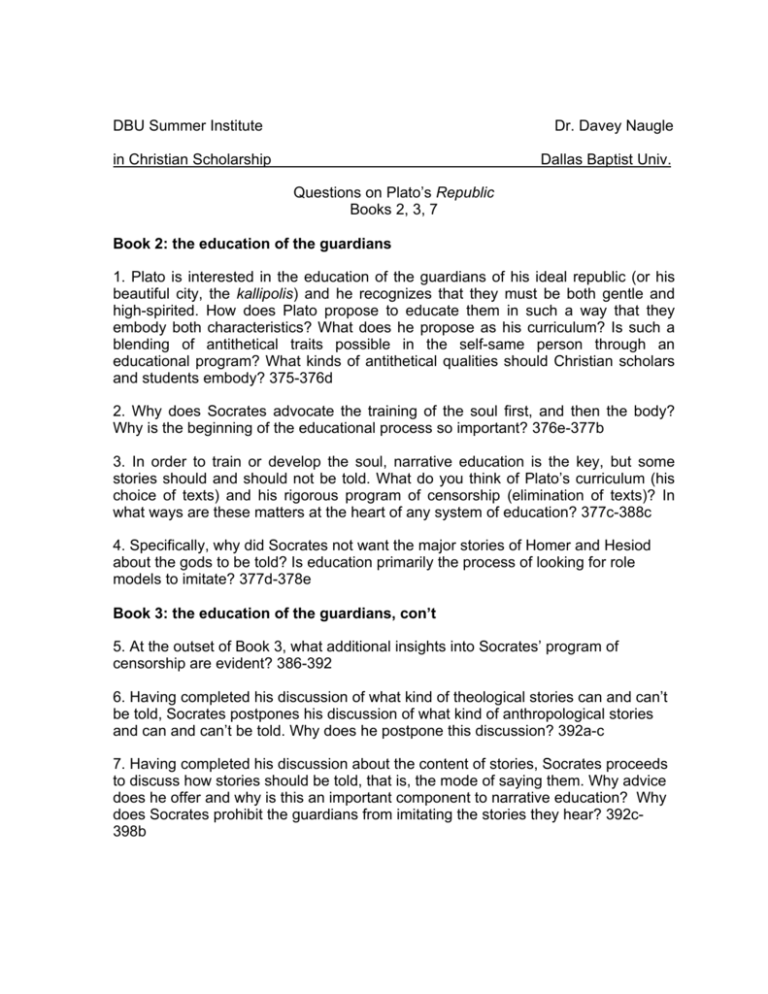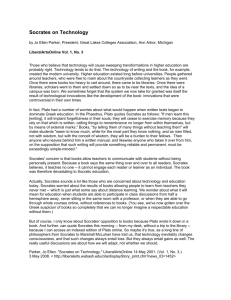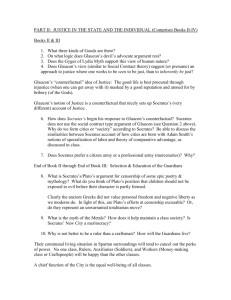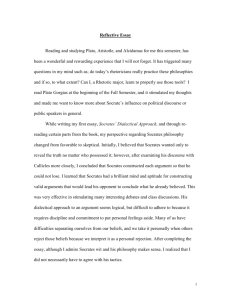Questions on Plato's Republic
advertisement

DBU Summer Institute Dr. Davey Naugle in Christian Scholarship Dallas Baptist Univ. Questions on Plato’s Republic Books 2, 3, 7 Book 2: the education of the guardians 1. Plato is interested in the education of the guardians of his ideal republic (or his beautiful city, the kallipolis) and he recognizes that they must be both gentle and high-spirited. How does Plato propose to educate them in such a way that they embody both characteristics? What does he propose as his curriculum? Is such a blending of antithetical traits possible in the self-same person through an educational program? What kinds of antithetical qualities should Christian scholars and students embody? 375-376d 2. Why does Socrates advocate the training of the soul first, and then the body? Why is the beginning of the educational process so important? 376e-377b 3. In order to train or develop the soul, narrative education is the key, but some stories should and should not be told. What do you think of Plato’s curriculum (his choice of texts) and his rigorous program of censorship (elimination of texts)? In what ways are these matters at the heart of any system of education? 377c-388c 4. Specifically, why did Socrates not want the major stories of Homer and Hesiod about the gods to be told? Is education primarily the process of looking for role models to imitate? 377d-378e Book 3: the education of the guardians, con’t 5. At the outset of Book 3, what additional insights into Socrates’ program of censorship are evident? 386-392 6. Having completed his discussion of what kind of theological stories can and can’t be told, Socrates postpones his discussion of what kind of anthropological stories and can and can’t be told. Why does he postpone this discussion? 392a-c 7. Having completed his discussion about the content of stories, Socrates proceeds to discuss how stories should be told, that is, the mode of saying them. Why advice does he offer and why is this an important component to narrative education? Why does Socrates prohibit the guardians from imitating the stories they hear? 392c398b 2 8. Socrates turns his attention to music education in 398c. What kinds of strictures does he place on this mode of instruction and why? What connect is there between music education and character? 398c-401d 9. Why does Socrates say education in music and poetry is so important in 401d-e? Unpack the content of this paragraph! 10. What is the thrust of the analogy Socrates makes in 402b-c? Unpack the content of this paragraph! 11. Socrates’ educational goal seems to be a sound mind in a sound body. What do you think of this goal as it is presented in 402d? This is the heart of the concept of Greek “paideia.” Explain. Is this goal compatible with a Christian view of education? 12. Socrates’ discussion of physical education begins in 403c. What are its basic components What are the guardians to abstain from in their physical training? 403c404e 13. What is the sign of a bad and shameful education in a city? 405a-d Hint: it has to do with doctors and lawyers. What are the basic principles here? See also 410a-b What kinds of people make the best doctors and the best lawyers or judges? 408d409c 14. Why is a balance needed between musical and poetic education along with physical training? What is the ultimate aim? 410c-411e 15. Out of these who have been so educated, who is to rule and who is to be ruled? What is the basis for the selection of rulers? 412b-414b How does the “myth of the metals” reinforce this? 415a-d What is to be the lifestyle of these rulers? 416d-417b Is this a reasonable proposal? Book 7: the education of the philosopher-kings 14. What kinds of lessons on education can you get from the famous cave analogy in 514a-517c 15. What is the nature of true education according to Socrates, especially in terms of teaching (or lack thereof)? What kinds of practical pedagogical lessons does this suggest even for Christian professors? 518b-e 16. Why is it that the philosopher king is the best kind of ruler? 521a-c How do these rulers arise? Which sciences, what curriculum, possesses the power to prepare them to be rulers as philosopher kings? What are the specific components of the curriculum discussed in the lengthy section from 521c-534e? Consider these 3 elements: number and calculation 522c; geometry 526c; astronomy 527d; harmonics 530d; dialectic/logic 532a 17. What kinds of virtues should the students possess who study this curriculum and who would become philosopher-kings? 535b 18. When should this education begin and what should be acquired at specific ages? 536c-537d What other interesting education principles are found in this section? 19. How is the study of philosophy (dialectic) are real danger? How can that danger be avoided? 537d-539d 20. When are these students finally ready to rule? At what age? Does this apply only to men, or to women as well? 540a-e 21. What do you think of Plato’s scheme of education as presented in the Republic?







